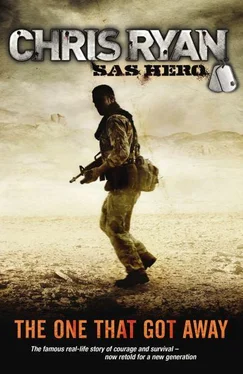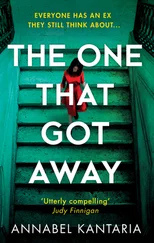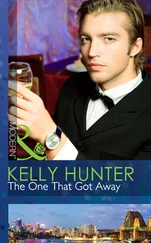It’s an execution squad , I thought to myself, and my blood ran cold.
We came to a halt. I was dragged out, run up to the back of one of the Mercedes and thrown down on my knees. Somebody pushed my head forward and I sensed someone standing behind me.
Silence.
Nobody moved or spoke.
I thought I was going to die.
Until then I’d always reckoned that if anything like this happened to me, I’d make a last-ditch run for it. But I was physically incapable of running. I just knelt there, waiting for him to shoot me in the back of the head. It was a terrible feeling, to be on my knees, expecting someone to do that to me.
The silence seemed to last for ever. In fact, it was probably less than a minute. Then there was a movement. I was pulled to my feet and thrown into the back of a car. The doors slammed and we drove off again.
Now I had three escorts, all in Western civilian clothes. On my left sat the youngest, a skinny fellow with a thin, weaseley face and a straggling moustache. He struck me as a weak character. The driver was quite a big fellow — dark, good-looking, maybe my own age, and wearing a black leather jacket. His front-seat passenger was about forty: chubby, and going thin on top, he wore a green safari-type jacket with patch pockets. All three had ties, but they had pulled the knots loose, and their appearance was scruffy.
Who were these guys? Police, I hoped. But why were they messing about so much? In my state of exhaustion and confusion, I didn’t know what to think. I considered trying to take them out. I still had my knife on me — but the car was travelling fast, probably at 70 or 80 mph for most of the time. Also, there was another car escorting us, and police outriders. The desert we were going through was very open, with nowhere to hide.
My shamag was still on, but the guy in the passenger seat pulled it down far enough for me to see. Then, leaning over into the back, he began to strip-search me: he took off my ID discs by pulling the cord over my head, undid my boot laces, removed my watch, emptied my pockets, took my notebook and map. He missed my belt, which had the gold sovereigns taped to the inside.
That was another frightening moment. If I’m going to safety , I thought, they shouldn’t be doing this to me . Could these fellows really be the Syrian police? If not, who were they? Why were they behaving like this? It was all very strange and alarming.
After a while they blindfolded me again. They talked a bit among themselves, and played loud Arabic music on the stereo. They also chain-smoked.
Soon I was in agony. In the warmth of the car — the highest temperature I’d been in for days — my feet and knees began to swell. The pain became excruciating and I kept trying to ease the agony by shifting around. I was finding it harder and harder to breathe, especially with all the cigarette smoke, and I started feeling claustrophobic. ‘Can’t you take the blindfold off?’ I asked. Until then, whenever I’d tried to pull the shamag off my face, the guy in front had twitched it back. Now, though, he seemed to realize that I was in trouble, and let it drop out of the way.
The second Mercedes was ahead of us now. Whenever we came to a village, our outriders went ahead on their motorbikes to seal off any side roads, so that we could go speeding straight through. Then they’d come howling past us and take the lead again.
The scrawny fellow next to me kept poking me in the ribs and going on about the war. ‘What were you doing in Iraq? You shouldn’t be here. Do you like Americans?’
At any other time I’d have thumped him. As it was, I grunted short answers. I didn’t want to give anything away. I still didn’t know who these people were, or what they were doing. I felt fairly confident they weren’t taking me to Baghdad, the capital of Iraq and Saddam Hussein’s centre of power, but I thought they might be going to hand me over to some terrorist group as a hostage.
Sometimes our driver would overtake the other car and lead for a while. Every time we came to a village, one of my escorts would pull the shamag over my eyes so that I couldn’t see any names. But after four or five hours I looked ahead and saw a motorway sign coming up.
In enormous letters it said: BAGHDAD. With a big arrow pointing from right to left.
My heart dropped.
The driver said something to the fellow beside me, who started poking me in the ribs and cackling. ‘Yes, you right. You going Baghdad! You going where Baghdad is.’
I was growing angry — partly with the idiot beside me, partly with myself. How the hell had I ended up in such a situation? Why had I given myself up to these people? Why hadn’t I tried to pinch a vehicle and drive myself to Damascus?
The front-seat passenger turned to me and said, ‘Yes — we’re Baghdadis.’
I tried to get my mind in gear. I had to accept that I was going to a prison camp. I was going to be interrogated. I was going to get a bad kicking, a beating. Think your thoughts , I told myself. Get organized .
I considered doing a runner, but it was impossible. I was physically exhausted, and wouldn’t have gone a hundred metres. It’s no good ,’ I told myself. They’ll have you . Instead, I sat still, trying not to annoy my escorts by fidgeting.
Every part of me was aching: back, shoulders, knees — but worst of all, my feet. Although I’d drunk the water and tea in the barn that morning, I was desperately in need of both food and more liquid. I had been weakened more than I realized. My mind was so confused that I couldn’t remember the simplest details of everyday life.
Through my blindfold I could see and feel that we were heading towards the sun, and that hour by hour the sun was going down. But what did that mean? Did the sun set in the east or in the west? Unable to remember, I tried to think back to what used to happen when I was a kid. Gradually I got it: from my bedroom at home I could see the sun coming up. That was the direction of Newcastle and, further off, China. That meant the sun rose in the east, and set in the west. Now we were heading into the setting sun: therefore we must be driving west.
In that case, I told myself, we couldn’t be going to Baghdad.
For the final half hour or so they kept my head wrapped up. Then darkness fell, and still we went on driving, until in the end we hit the outskirts of some town or city. By then the blindfold was off again, and I started to see signs saying: DAMAS.
Desperately I tried to visualize the map and remember which part of Syria Damascus was in. I began daring to hope that we were approaching the Syrian capital, and that my companions had just been winding me up.
My escorts started to smarten themselves up. They put out their cigarettes, turned off the radio, slid their ties tight and straightened their clothes, as if preparing to meet somebody important. All that alarmed me. What were they getting ready for?
Then, on a piece of waste ground, we pulled into the kerb, behind yet another Mercedes. The front passenger got out. His place was taken by a man of maybe fifty; he was well-dressed and balding a little. His dark suit gave him a sombre appearance, but at least he looked cool and calm. The other two characters in my car were obviously in awe of him. As he walked towards us they stopped chattering, and more or less sat to attention, hardly daring to breathe.
The new man closed his door and gave a short order. We moved off towards the city centre. Every now and then he snapped a direction at the driver: ‘Left… right,’ and that was all.
After about five minutes he turned round and asked in English, ‘Are you OK?’
‘Yep,’ I nodded
‘Won’t be long now.’
Читать дальше












